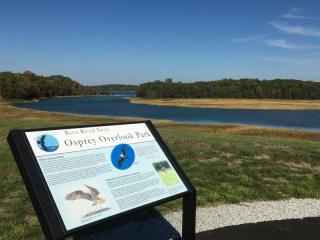Osprey Overlook Park

Find park dedication photos here.
Osprey Overlook Park is a recovered natural setting that overlies a capped landfill. The park offers intimate access to the Weymouth Back River as well as direct access to walking trails at Great Esker Park. The park was completed with $248,886 in local Community Preservation funds and a $157,024 grant through the federal Land and Water Conservation Fund (LWCF).
Osprey Overlook Park was designed by Kyle Zick Landscape Architecture of Boston and constructed by Dayco Construction of Salem in the spring and summer of 2017. The park includes an accessible overlook with views of the Back River, a loop walking trail connecting to Great Esker Park, and an interpretative panel that educates visitors on the characteristics and history of the osprey that fish and nest along the Back River.
Osprey Overlook Park is the third installment of the Weymouth Back River Trail, a comprehensive community trail that will run the length of the Back River upon completion. Construction of the park was first proposed in the Town’s Back River Trail Master Plan, completed in 2005, and its final design is consistent with the Town’s 2014 Open Space and Recreation Plan (OSRP) and Massachusetts' 2012 Statewide Comprehensive Outdoor Recreation Plan (SCORP).
Site History
The Town incinerator was constructed in 1965 but ceased operations only 11 years later after adoption of new federal regulations under the Clean Air Act. The site remained active as a transfer station through the 1990s and was finally capped and closed in 2000. The landfill is now sealed by a protective membrane and vented by pipes. Its use is governed by MassDEP regulation 310 CMR 19.000.
Passive recreation is permitted on any capped landfill with the approval of MassDEP. "Passive recreation" refers to self-generated, unscheduled activity that has little or no impact on the natural environment and does not requires use of a delineated playing field or hard court. Examples of passive recreation include walking, wildlife observation, and viewing vistas.
Land and Water Conservation Fund
The federal Land and Water Conservation Fund (LWCF) provides 50-percent matching grants to state and local governments for the acquisition, development, and renovation of park, recreation, or conservation areas. Nearly 4,000 acres have been acquired and hundreds of parks renovated using the more than $100 million that Massachusetts has received from the state-side portion of the federal program since 1965.
In Massachusetts, the LWCF program is administered by the Executive Office of Energy and Environmental Affairs. Any community with an up-to-date Open Space and Recreation Plan is eligible to apply to the program. Funding for the program is available through royalties paid by energy companies drilling for oil and gas on the Outer Continental Shelf.
Related Documents/Links
- Video: Osprey Overlook Park Dedication (WETC, Oct 2017)
- Interpretive Panel (KZLA, 2017)
- Trailhead (KZLA, 2017)
- Video: Development Update - Osprey Overlook Park and Athletic Fields (WETC)
- Landfill Post-Closure Use Certification Report (DCI, Sep 2017)
- Order of Conditions (Conservation Commission, Aug 2016)
- Site Plan for Construction (KZLA, Jun 2016)
- Notice of Intent (NOI) Application Plans (KZLA, Jun 2016)

